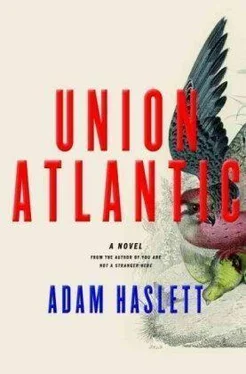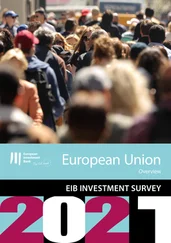“The other thing I guess people always say is that a person is up in Heaven and that they’re in a better place now, and I suppose that much I agree with. Carson is in heaven, and it’s surely better than what we have down here. God bless his mother and his sister and may he rest in peace.” Unclasping her hands, she stepped off the stage and Evelyn lifted her mother’s bent form high enough to let her aunt pass back along the row to her seat.
The minister, taken aback by the tone and brevity of the family remarks, assumed his place again before the coffin and, wearing his best somber expression, led the congregation in a subdued rendition of “All to Jesus I Surrender.”
THE FOLLOWING DAY, Evelyn returned to work. She had been employed at Atlantic Securities for eight years and after three promotions was now chief settlements administrator with her own office, albeit without a window. Her job, part of the firm’s back-office operation, was to execute the delivery and receipt of assets. In order to take effect, each order that a trader shouted into a trading pit or placed with a dealer had eventually to move through the more orderly process of settlement — the actual transfer of money and instruments from one institution to another. This took place anywhere from hours to months after the initial promises had been made. Evelyn didn’t make the decisions that led to the transfers, and she bore no responsibility for the loss or gain they represented, but without her approval no money changed hands.
Her first morning back, she concentrated as best she could on her screen, drawing her eyes over the initials of counterparties and clearinghouses, tapping in payment codes, her hands moving over the keypad with unthinking speed, toggling in and out of the software’s fifty-odd forms. She found that her mind was able to float as she went, some well-grooved path in her brain slipping into the circle of automation. And she was thankful for that repetition; it was a kind of blessing, the way it allowed her to forget for spells of a few moments at a time.
As she was drawing up her final tallies for the day, her assistant, Cressida, knocked on her open door. She was a rather shy, single black woman, whom Evelyn had recruited from Boston College through the company’s minority-outreach program. Evelyn had told her any number of times there was no need to announce herself, that she should just come in and say straight up what she needed, but Cressida had persisted in her apologetics. Having known such hesitancy in herself back when she first started out, Evelyn recognized it as the first, useless defense against criticism, one that excited precisely what it sought to deflect. There were businesses where deference would get her somewhere. Banking wasn’t one of them. She wished she had it in her to drum the message home again, to set the girl straight once and for all, but she lacked the will this evening.
“It’s about the house accounts,” she said.
“You’re going to have to remind me, darling. Come on now, sit down.”
“From the Hong Kong office,” she said, perching on the chair opposite Evelyn. “The unresolved trades. I’m not sure how you want me to enter them in the log.” She looked at the paper in her hand as if ashamed of her admission.
At the college job fair, sitting across the folding table from her in the gymnasium, Cressida had worked so hard to strike a confident note, delivering her rehearsed lines about experience and interest like an actress unsure of her character’s motivation. As a recruiter, Evelyn knew she was supposed to be sorting for focus and drive, weeding out the young men and women who seemed unsure of themselves, selecting instead those model minority students who not only grasped the rules of the presentational game, suggesting their ability to pick up the rules of games to come, but also seemed to embrace them, taking a kind of hushed, understated pleasure in the well-groomed display of their credentials; those were the ones whose obedience you could count on, their fear of scarcity already marshaled into conservative ambition. Cressida had shown none of this, arriving in an ill-fitting pantsuit clearly borrowed for the day, her résumé on plain white paper, just as Evelyn’s had been at the first bank she interviewed with.
She had wondered in the year since she’d hired Cressida if sympathy were a form of nepotism, a favoring of emotional kin. With the exception of a few mistakes at the beginning, the kind anyone might make, she had performed well. It seemed to Evelyn that her vote of confidence had done what it was supposed to do, encouraging the young woman to rise to the occasion. It was just that she couldn’t dislodge the thought that she had chosen Cressida for her company as much as for her fit.
“Which trader?” she asked.
“McTeague.”
She took the account sheet from Cressida and glanced quickly at its contents. Trading floors were chaotic places and in the course of a day there were always a few botched transactions that had to be placed in house accounts to be resolved once the market closed. Some traders didn’t get around to working out these “fails” for a day or two. McTeague, however, often took weeks, carrying over millions of dollars in scrub positions. Because he had been put in charge of the back office in Hong Kong he was his own boss on accounting matters. All Evelyn could do was complain to him about his laxness, which she’d done several times to no avail. Nonetheless, the data on this sheet had to be a mistake; it showed McTeague’s house account holding an un-reported loss of three hundred and forty million dollars.
“Who gave you this?”
“Sabrina. Same as usual.”
“This came out of Fanning’s office?”
Cressida nodded.
Evelyn had never met Doug Fanning but she had been in the same room with him a couple of times at company functions and she had seen him operate. He got a lot of mileage with the staff out of his apparently casual approach to people, which, because of his unofficial status as second-in-command of the entire holding company, struck people as unusually egalitarian. He had championed, in prominent fashion, the renovation of the second floor as a free, company-wide gym, and was known for walking the halls after his workouts still in his shorts, setting the phones of the husband-hunters flashing with gossip. And yet for all his show it wasn’t the usual cocky, know-it-all, young banker’s affect that came through. There was something different about him, something Evelyn recognized: the extra effort of the uninvited. She didn’t quite trust him.
Which was why, rather than call Fanning to alert him of what she’d discovered, she instead tried Brenda Hilliard upstairs in compliance. If this was a misappropriation of funds, that department would have to be notified, regardless of who McTeague reported to. She got Brenda’s voice mail. By then it was after nine o’clock and most everyone had gone home, the whine of the vacuum cleaner starting up at the far end of the hall. She decided to send Brenda a quick e-mail, saying she needed to talk to her in the morning.
As she and Cressida left the sealed quiet of the lobby through the revolving doors and emerged onto Congress Street, the cooler night air swallowed them, carrying with it the hum and rush of the expressway. They turned onto Purchase Street, a few taxis tapping their horns for a fare, black women in business suits in this part of town apparently good enough for their services; ignoring them, they crossed the plaza in front of the Boston Fed and made their way into South Station.
Evelyn had never felt comfortable with co-workers outside the office and strangely only the more so with Cressida, to whom so much else might be said. Above all she didn’t want to disappoint the girl by seeming weak. Cressida had been the one, Evelyn felt sure, who had organized the office to send flowers to Carson’s funeral, in addition to the flowers she herself had sent.
Читать дальше












